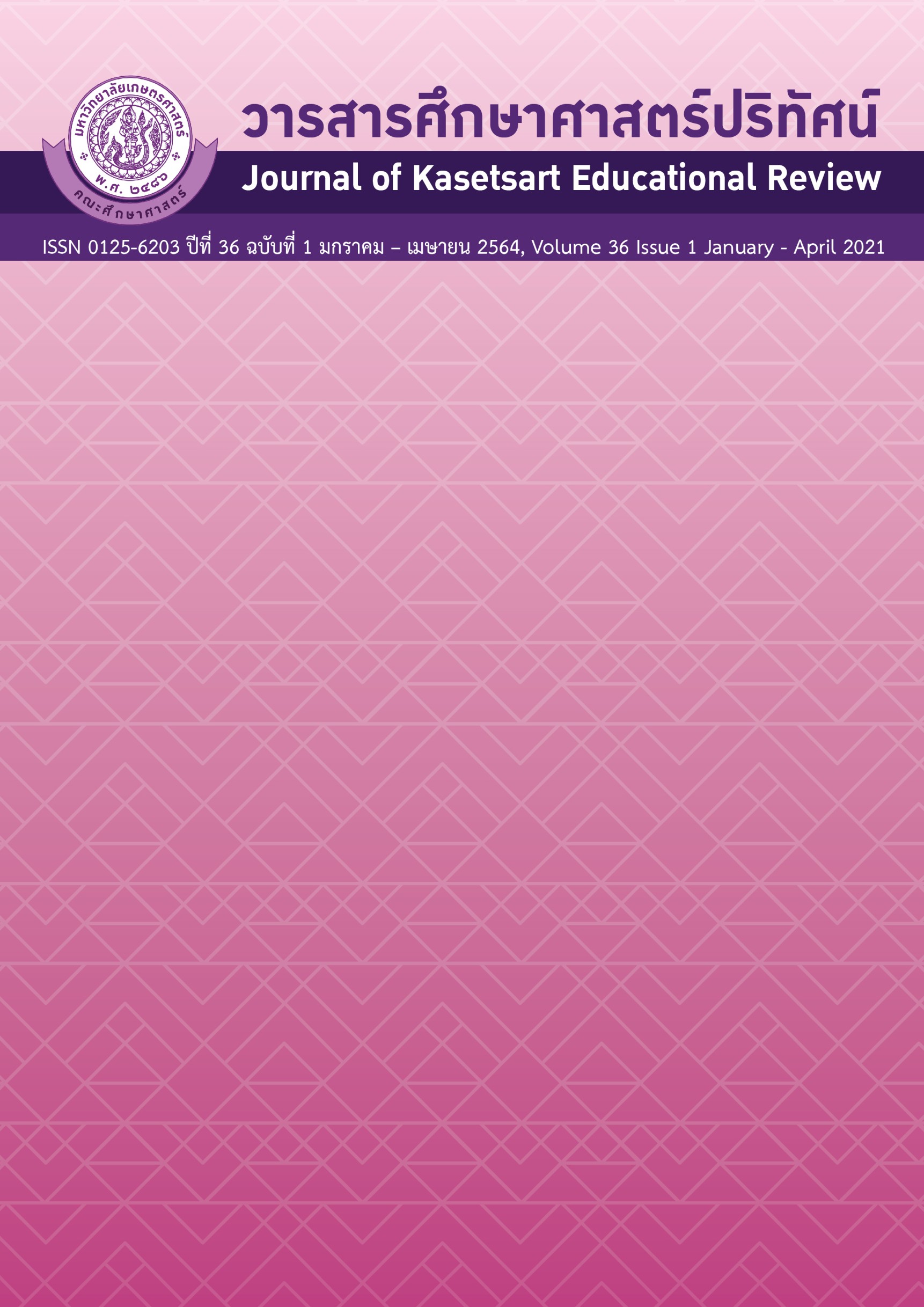ผลการจัดกิจกรรมการเรียนรู้โดยใช้รูปแบบ SSCS ร่วมกับการใช้ตัวแทนที่มีต่อความสามารถในการแก้ปัญหาและผลสัมฤทธิ์ทางการเรียนคณิตศาสตร์ เรื่อง ความน่าจะเป็นของนักเรียนชั้นมัธยมศึกษาปีที่ 3
คำสำคัญ:
รูปแบบ SSCS, การใช้ตัวแทน, ความสามารถในการแก้ปัญหา, ผลสัมฤทธิ์ทางการเรียนบทคัดย่อ
การวิจัยครั้งนี้มีวัตถุประสงค์เพื่อ 1) ศึกษาความสามารถในการแก้ปัญหาทางคณิตศาสตร์ของนักเรียนชั้นมัธยมศึกษาปีที่ 3 เรื่อง ความน่าจะเป็น โดยใช้รูปแบบ SSCS ร่วมกับการใช้ตัวแทน และ 2) ศึกษาผลสัมฤทธิ์ทางการเรียนคณิตศาสตร์ของนักเรียนชั้นมัธยมศึกษาปีที่ 3 เรื่อง ความน่าจะเป็น โดยใช้รูปแบบ SSCS ร่วมกับการใช้ตัวแทน
กลุ่มตัวอย่าง คือ นักเรียนชั้นมัธยมศึกษาปีที่ 3 โรงเรียนนครสวรรค์ ภาคเรียนที่ 2 ปีการศึกษา 2562 จำนวน 1 ห้องเรียน จำนวนนักเรียน 40 คน ซึ่งได้มาจากการสุ่มแบบกลุ่ม
จากทั้งหมด 12 ห้องเรียน เครื่องมือที่ใช้ในการเก็บรวบรวมข้อมูลประกอบด้วย แผนการจัดการเรียนรู้ เรื่อง ความน่าจะเป็น โดยใช้รูปแบบ SSCS ร่วมกับการใช้ตัวแทน จำนวน 10 แผน แบบทดสอบวัดความสามารถในการแก้ปัญหาทางคณิตศาสตร์ เรื่อง ความน่าจะเป็น และแบบทดสอบวัดผลสัมฤทธิ์ทางการเรียนคณิตศาสตร์ เรื่อง ความน่าจะเป็น การวิเคราะห์ข้อมูลใช้การคำนวณค่าร้อยละ ค่าเฉลี่ย ค่าเบี่ยงเบนมาตรฐาน และสถิติทดสอบค่าที
ผลการวิจัยพบว่า 1) นักเรียนมีความสามารถในการแก้ปัญหาทางคณิตศาสตร์ เรื่อง ความน่าจะเป็นอยู่ในเกณฑ์ดี และ 2) นักเรียนมีผลสัมฤทธิ์ทางการเรียนคณิตศาสตร์หลังเรียนสูงกว่าเกณฑ์ร้อยละ 70 อย่างมีนัยสำคัญทางสถิติที่ระดับ .05
เอกสารอ้างอิง
Function of Mathayomsuksa IV Students on Mathematics Problem Solving.
Dissertation of Master of Education Degree in Secondary Education in
Srinakarinwirot University. [in Thai].
Kasee, J. (2018). The Effects of SSCS Activities to Enhance the Ability to Solve
Mathematics Problems and Mathematics Achievement of Mathayomsuksa 3
Students. Graduate Studies Journal, 15(70), 149-158. [in Thai].
Ministry of Education (MOE). (2017). Learning standards and indicators for learning
Mathematics, Science, and Geography In the group of learning, social studies,
religion and culture (Revised version 2017) according to the core curriculum of
basic education, BE 2008. Bangkok: Printing Company Limited Agricultural
Co-operative Federation of Thailand., Ltd. [in Thai].
National Council of Teachers of Mathematics. (2000). Principles and Standards for School
Mathematics. Reston, Virginia: National Council of Teachers of Mathematics.
National Institute of Educational Testing Service. (2019). The Basic Statistics of
Ordinary National Educational Test (O-NET), Mathayomsuksa Three,
Academic Year 2018. Retrieved from. http://www.niets.or.th. [in Thai].
Office of the Education Council (ONEC). (2017). National Education Plan 2017 – 2032.
Bangkok: Prigwhangraphics., Ltd. [in Thai].
Pizzini, E. L., D. P. Shepardson, and S. K. Abell. (1989). A rationale for and the
development of a problem solving model of instruction in science
education. Science Education, 73(5), 523-534.
Polpan, S. (2013). The Effect of Explicit Learning Management Emphasizing on
Representation in “Integer System” on Academic Achievement and
Mathematical Communication Skill of Mathayomsuksa I Students.
Veridian E-Journal, 6(3), 211-227. [in Thai].
Punpumnak, T. (2019). Learning Management Using SSCS Model for Enhance
Mathematics Learning Achievement and Problem Solving Skill on Probability
of Mathayomsuksa 3 Students. Dissertation of Master of Science (Mathematics
Education) in Mahasarakham University. [in Thai].
Singer, M. & Voica, C. (2012). A problem-solving conceptual framework and its implications
in designing problem-posing tasks. Educational Studies in Mathematics, 83(1), 9-26.
ดาวน์โหลด
เผยแพร่แล้ว
ฉบับ
ประเภทบทความ
สัญญาอนุญาต
บทความทุกบทความเป็นลิขสิทธิ์ของวารสารคณะศึกษาศาสตร์ มหาวิทยาลัยเกษตรศาสตร์ วิทยาเขตบางเขน
วารสารศึกษาศาสตร์ปริทัศน์ (Kasetsart Educational Review)






